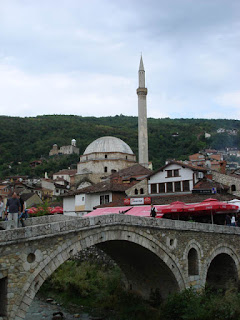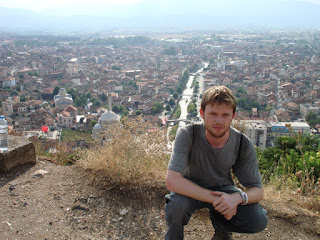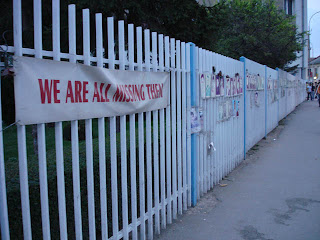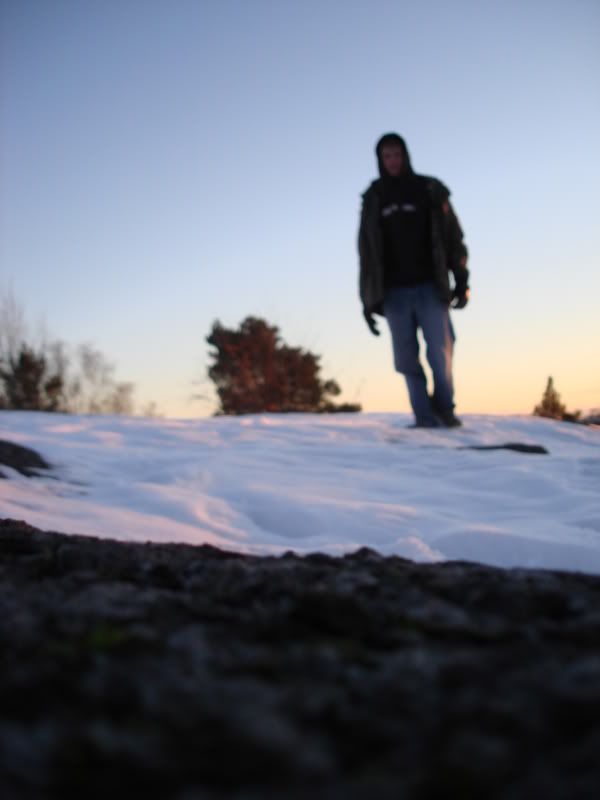Kosovo - Prishtina, Prizren & Peja
Kosovo is a strange place to visit as a tourist. My only knowledge of the place concerns the recent war and continuing ethnic strife that has seen plenty of coverage in the international press. Lately, it has been in the headlines again as much discussion takes place at the UN over a final decision on its constitutional future. At the moment, Kosovo is still legally part of Serbia, although it is now fully autonomous in a form of 'supervised independence' overseen by the UN. The vast majority of its people want full independence, with the small Serbian minority opposed.
 A statue of an Albanian 'freedom fighter' in Prishtina
A statue of an Albanian 'freedom fighter' in PrishtinaI was glad not to be venturing to Kosovo on my own, having met a couple in the hostel in Skopje who also wanted to go. With there being just the one budget hotel in Prishtina, it made sense for us to journey together.
We got the bus from Skopje and very soon started to pass military warning signs and camouflaged vehicles bearing UN insignia. We were already at the border. As I soon came to find, nearly everything important in Kosovo is run by the UN. The border was no exception, with the United Nations Border Guard making us get off the bus as they checked through our bags. They even put a UN stamp in my passport.
Once through the checkpoint I found Kosovo to look quite unlike how I expected. There were no visible remnants of war, or damage and there was a vast amount of new buildings and infrastructure. Enormous amounts of foreign aid has flooded into the country since the conflict, and unlike Bosnia which still has very visible scars, here they seem to have, in a way, very rapidly swept everything under the carpet.
On arrival in Prishtina, the capital, we took a taxi through the backstreets to the guesthouse and were met by the owner, a friendly and rather eccentric local professor who had recently opened up his home to foreign guests. After unloading our luggage, we then took a taxi back to the bus station and caught a bus to Prizren, a village in the south of the province.
This was our first real experience on-foot in Kosovo, and it was quite an interesting place for it. Prizren suffered a recent outbreak of serious violence in 2004, which resulted in the burning of Serbian homes up the hillside and destruction of several churches. Indeed, we passed the remains of one medieval church, which had been completely blown up. Tellingly, on the outside was spray-painted 'No Negotiation', a reference to the ongoing negotiations with Serbia over independence. It is shocking that centuries of cultural history can be so senselessly wiped out in such way.
The rest of the town was very pleasant. We visited a mosque, walked through the old town and climbed up to a castle with a spectacular view for miles around. In the castle I met some Canadians who were filming a feature-length documentary on Kosovo. Being something of a film geek myself, we had a lengthy discussion about what they were doing and from the sounds of it, the documentary may make quite a splash when it comes out.
We headed back to catch the last bus, and at the station met the only other foreigners we'd seen in the town, two french girls. One of them had been working as a journalist in Kosovo for several months now, so she was able to give a valuable insight into the place. Once back in Prishtina, we arranged to meet up in the evening.
That night we all met up, in perhaps the creepiest place possible, in the middle of a pitch-dark park, outside the shell of a large half-built church, whose construction was stopped years ago. That's the last time I let other people choose a meeting place! The french girls took us to a street full of bars, where we sat outside and had a meal of local food. Interestingly, the journalist had been in Kosovo for 9 months and not seen a single incident or outbreak of violence, so perhaps the peace here is a little more secure than it seems.
We stopped by the locally well-known Phoenix Bar, next to the UN, a favourite of peacekeepers and soldiers apparently, although we didn't spot any. The next day I was on my own again, as the couple I travelled with moved on. I went back to the Phoenix for a desperately-needed full-english cooked breakfast, my first on this trip and one of the few culinary delights I miss about the UK. I got talking with the barman, a local, and had a revealing discussion about the real situation here.
He didn't seem to have much hope for Kosovo's future, saying Kosovans are too lazy to work and once the foreign aid dries up (which it is already starting to), the economy will sink even further. He was also quite envious of my position travelling eastern europe, as it is very difficult for locals to get visas. It's a shame that he's so pessimistic but perhaps that's what going through such a terrible conflict can do to you. I asked him where I should go next and he strongly recommended Peja, so I jumped on a bus and headed to the small northern town.
I walked into the town centre and wandered through the bazaar, which was definitely worth a look and sold all kind of things, including a stall dedicated to nationalist Albanian flags and ornaments. My guide book recommended a visit to the Serbian monastery here, but warned that it is very difficult and at times impossible to gain entry. I decided to try my luck, but finding it proved the biggest challenge.
Eventually I asked in a shop and was given the directions, in German, which luckily I was able to understand. Many people in the town speak either German or Italian as a second language due to the nationality of the UN peacekeepers in this region. I walked a couple of kilometres out of town and as the number of KFOR patrols increased, I knew I was getting close. After interrogation at an Italian military checkpoint, I was given a pass and allowed to proceed into the monastery.
Inside was one of the most serene places I have ever been. A stream gently flowed through the beautiful trees and flowers and with the towering mountains as a background, it was quite an incredible setting. An elderly nun kindly unlocked the church for me, the inside of which was dark but I could just make out the wonderful frescoes covering the walls and ceiling. It really is a shame that such a peaceful place has to be so heavily defended.
From what I can gather, the monastery is the seat of the Serbian patriarchy, and therefore part of the reason why Serbs consider Kosovo to be the birthplace of Serbian culture and want it to remain a part of their country. It's worrying that once the international troops leave, the monastery, along with other Serb churches and communities, could be put at risk of reprisals.
It seems that being ethnic Albanians, the population are just as nice as in Albania itself. Despite undergoing such hardship, I was warmly welcomed by the people I encountered, from an inquisitive ice cream seller, who wanted to know why I had come to Kosovo, to more than one group of kids who stopped me and wanted to know what I thought of the place. This really is such a fascinating region, full of kind and intelligent people, and I just hope they stay level headed in the times ahead and choose a path of peace.
Labels: Balkan, Kosovo, Peja, Prishtina, Prizren, Yugoslavia
















1 Comments:
Well lovely to hear you had a nice time there. Hope you were there for the party (please don't ask which party!!). Well, anyhow, try and make it back to the REPUBLIC OF KOSOVA next year, as I'm sure it will be celebrated.
I definitely have to be there!
Bye - Nika
Post a Comment
<< Home